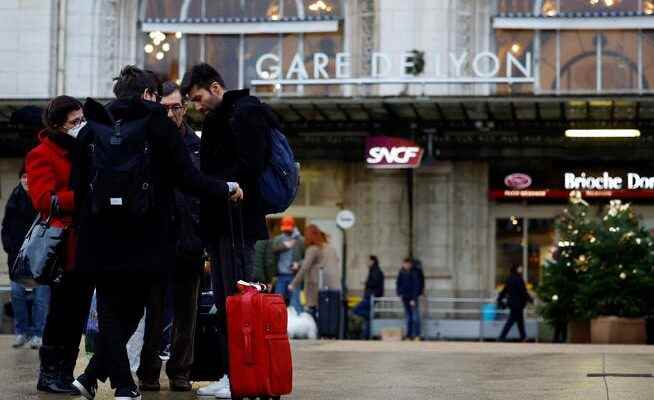Ironically, on the holidays, train attendants in France are on strike. Around 200,000 travelers have to reorganize or stay at home. A second weekend of protests on New Year’s Eve was averted – for now.
Anyone who travels by train in France these days needs a lot of patience.
The pandemic had spoiled Christmas for the French for the last two years, this year it’s the SNCF. At least that applies to that part of the population who have opted for a train journey for family reunions. The controllers of the state railway operator are on strike. Between December 23rd and 26th, depending on the day and region, a quarter to a third of the trains are canceled – especially on the TGV routes. As a result, around 200,000 travelers are unable to take their booked journey. Connections to Switzerland are also affected.
The SNCF has not only promised those affected a full refund, but also a voucher for twice the ticket price. Not only the website of the railway is overloaded at times; those of car rental companies and providers of bus travel have also experienced a rush in the past two days. Strikes are certainly not uncommon in France – but in contrast to many other protest movements, the population has little understanding of the inspectors’ protest.
A movement from below
Several government representatives also showed their incomprehension and President Macron is said to have expressed displeasure. After all, at the last moment he had postponed the presentation of the controversial pension reform, which was scheduled for mid-December, to January – as is suspected, in order to avoid protests before the holidays. But the appeals to reason, solidarity and fraternity repeated by the SNCF group and government officials in recent days have gone unheeded.
What is special about this protest movement is that it did not come from the trade unions. Around 4,000 to 5,000 dissatisfied inspectors had organized themselves autonomously via social networks. The four unions representing SNCF employees jumped on the bandwagon and issued a strike warning for the Christmas and New Year’s weekends earlier in the week. But they have remained remarkably reticent in the past few days.
Is New Year’s Eve saved?
After the fight for the Christmas weekend seemed lost on Wednesday, the company management and the government recently focused on at least saving the New Year’s weekend. On Thursday evening they managed to get a concession from the representatives of the four unions. On Friday morning they signed an agreement refraining from strike action next week. In return, the SNCF promised the around 8,000 “chefs de bord”, as the inspectors are called in this country, practically everything they had asked for: an increase in premiums, a wage increase every four years, a better status in the company hierarchy and 200 new hires against staff shortages.
Je me félicite que le dialogue social entre la direction de la SNCF et les syndicats ait porté ses fruits. Nous avions express l’importance et l’impératif de cet esprit de responsabilité.
The service you do it désormais être pleinement assured for the week-end du New An @SNCF— Clement Beaune (@CBeaune) December 23, 2022
The SNCF group management and several government representatives were pleased on Friday about the success of the negotiations, which averted disruptions to the New Year’s Eve weekend. Initially, little was heard from the train attendants. One of them told the broadcaster France infosince most of the demands have been met, that should satisfy many.
However, the episode didn’t just complicate – or even spoil – the holiday season for thousands of French people. It has also shown once again how spontaneous protest movements can take trade unions hostage.
Because although the train attendants’ intention to go on strike had been known for weeks, the now highly praised dialogue only came about under massive political pressure – and too late to avert the damage. Four years ago, a protest movement organized on social networks had the country under control for weeks. The yellow vests, however, did not allow themselves to be pulled in front of the car by the trade unions or a political party.
